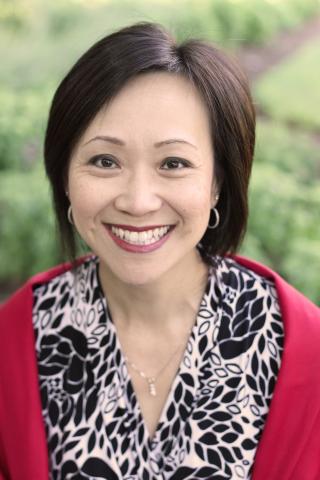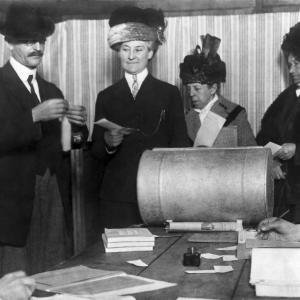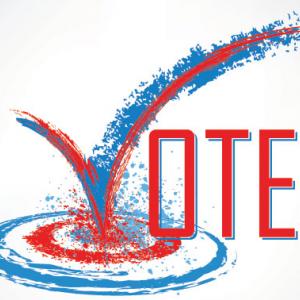
Kathy Khang, a columnist for Sojourners magazine, is the author of Raise Your Voice (InterVarsity Press, 2018) and co-author of More Than Serving Tea (InterVarsity Press, 2006). She blogs at www.kathykhang.com, tweets and Instagrams as @mskathykhang, posts at www.facebook.com/kathykhangauthor, and partners with other writers, pastors, and Christian leaders to highlight and move the conversation forward on issues of race, ethnicity, and gender within the church. Kathy also has worked for the past 19 years with a national parachurch organization.
Posts By This Author
It’s Easy to Forget Privilege When It’s Always Been Yours
I’m tired of reading blogs from my White Christian brothers about why they are choosing to vote. There. I said it.
I’m all for being a part of the democratic process, but it seems a bit odd to me that so many of these bloggers are coming from a position of power and privilege they themselves have always had. It seems a bit arrogant to choose something that was always theirs.
The way I see it, they had better vote. The vote of the White male is what finally allowed people like me – a woman, an immigrant, a non-native English speaker – to have the right to vote. I didn’t have a voice. I didn’t matter. Neither did my ancestors, who immigrated here under quota systems developed by people in power for the benefit of the country and the powers-that-be.
And there still are people who have no voice, who have no right to vote, but they are directly impacted by the politicians, referenda, judges, and local officials as well as the “agendas and policies.” As a Christian who is new to the process, its a privilege and responsibility I don’t take lightly because it isn’t a given. I’m not American born. We are not post-racial America, and the fact of the matter is the church isn’t either. We are working on it, but we aren’t there.
Did you know that in 1882 Congress passed the Chinese Exclusion Act denying citizenship and voting rights to Chinese Americans? Yup, they could build the railroads but they can’t vote.
Voting: Responsibility or Privilege?
Next week I will vote for the first time in a presidential election. I became a naturalized U.S. citizen two years ago, giving up my Korean passport, my (not)green card, and pledging allegiance after having lived in the U.S. since the spring of 1971.
I actually studied for my citizenship exam out of fear and habit – fear that the wrong answer would mean restarting a process that had cost money, time, and emotions, and habit because I grew understanding not studying was not an option. The process actually took years for me, wrestling through ambivalence, frustration, grief, and gain to get to a point where the privileges, advantages, and necessities of becoming a citizen and my faith as a Christian pushed me over the edge.
They're Not Racist. They Just Don't Know.
My sons, ages 13 and 10, spend two evenings each week on a golf course because I parent out of my own personal brokenness, which includes an acute awareness of life experiences and skills I was not exposed to growing up.
Tennis lessons. Skiing lessons. Swimming lessons. Golf lessons.
Check. Check. Check. Check.
(My daughter got the first three. She escaped golf because she has immersed herself into the world of dance for the past few years though it’s not completely out of the picture yet.)
One of my goals has been to expose my children to things I didn’t do and at one point or another felt like I had missed out on. This all despite the fact that I also wrestle with my own personal prejudices against sports like tennis and golf because they have in one way or another represented privilege and access to opportunities and networks my parents and I did not have.
So it did not surprise me to see a very diverse group of participants on our first day at the course – diverse meaning White or Caucasian children were in the minority. Golf, whether you are in business or in medicine, more if you are male but increasingly so if you are female, is one of those “life skills” that also translates into opportunities and networks that non-White communities continue to learn about and enter into.
Overcoming Depression (and Stigma) as an Asian American Woman
Today is my one-year anniversary on vitamin L, and it's finally time to talk about.
I struggle with anxiety and clinical depression, and I take vitamin L -- or Lexapro to be exact -- to treat it. It's been one year since I decided enough was enough. I was tired of being tired. Tired of being sad. Tired of always feeling on edge about almost anything.
Last spring I finally sought out the help I needed all along, and took some concrete steps in overcoming depression and the cultural stigma mental health issues carry within the Asian American, American, and Christian cultures. And that is where I find convergence, because May is Asian Pacific American Heritage Month, and it is also Mental Health Awareness Month. I couldn't have orchestrated it better myself.
The Social Network, Immigration, and Imago Dei
The Ultimate Insult? Call a Man a Woman
'Reasonable Suspicion' in Arizona
My Changing Understanding of Creation (and Five More Ways to Keep it Simple and Go Green)
Why Can't I Just Shut Up?
Reconciliation: Will I Know It When I See It?
The Balancing Act of a Successful Woman
Hollywood isn't real life, but when real life (mine and the lives of the actors) and Hollywood converge it is great fodder for thinking and conversation. Peter and I can't stop talking about a recent date night movie, Up in the Air, starring Vera Farmiga and George Clooney.


